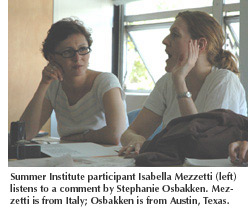| |
|||||
|
Future of sex ed. begins at SFSU Summer Institute | ||||
|
July 29, 2004 |
|||||
 Sex
is ubiquitous in America -- in pop culture, the arts and media and, of
course, the bedroom. But how does sexuality affect health? And would
more open and serious discussions on sexuality improve people's health?
These are some of the key issues explored at the third annual Summer
Institute on Sexuality, Society and Health held by the Human Sexuality
Studies Program and National Sexuality Resource Center (NSRC). Sex
is ubiquitous in America -- in pop culture, the arts and media and, of
course, the bedroom. But how does sexuality affect health? And would
more open and serious discussions on sexuality improve people's health?
These are some of the key issues explored at the third annual Summer
Institute on Sexuality, Society and Health held by the Human Sexuality
Studies Program and National Sexuality Resource Center (NSRC).
Throughout the four-week Summer Institute -- which wrapped up last week -- 78 students learned the latest in human sexuality studies trends, issues and research from some of the world's top experts on the subject. The Summer Institute's faculty, many from SFSU, taught classes on everything from transgender health and sexual deviance and conformity to changing communities' attitudes toward sexuality education. Few topics are too risqué or taboo for the group, which is trying to improve the sexual literacy of Americans. Information, education and communication are crucial to promoting better understanding about sexual health and sexuality in the United States, says Summer Institute director Professor Gilbert Herdt, who also serves as director of the Human Sexuality Studies Program and NSRC.
"Sex is everywhere but is captive to forces of shame," he says, noting the uproar over the Janet Jackson breast-slip incident at the 2004 Super Bowl halftime show. Societies in Western Europe, he adds, are far more open about sexuality and do a much better job of educating and communicating with their youth on the subject. The SFSU Summer Institute, Herdt says, provides a learning opportunity for the next generation of sexuality researchers and educators -- and a measure of "hope for the future." The students, who come from as far as Italy, Peru and Vietnam, tend to agree. Roc Callaway, a University of Texas, El Paso, graduate student whose thesis will focus on gay culture and sexuality issues, says that the Summer Institute provided him unique opportunities. "We don't have the resources on our campus, so this is a great opportunity to get a theoretical background and network with people interested in the same thing," he says. Others are also thrilled to visit San Francisco, one of the most accepting and open cities in the country. Trevor Hoppe, a political science major at University of North Carolina, Chapel Hill, previously visited the city as a child with his family but only now has had the opportunity to explore the Bay Area in further depth. Hoppe, a senior, works in sexuality advocacy and hopes the Summer Institute will help shape his career objectives. "Because of my experiences in homophobia and heterosexism, there is no better way to spend my time than to help people," he says. Students received six semester units or continuing education units for completing the program. The SFSU National Sexuality Resource Center Training Program offers annual Winter and Summer Institutes to graduate, postgraduate and undergraduate students from all over the world in addition to professionals such as teachers, counselors, social workers, doctors, lawyers and clergy. In fall 2005 a new 15-unit certificate program on Sexuality Education and Sexual Health will begin -- open to students, professionals and the general public seeking certification as sex educators and sexual health experts. -- Matt Itelson
|
|||||
 |
1600 Holloway Avenue, San Francisco, CA 94132 (415) 338-1111 |